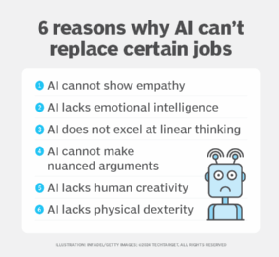8 jobs that AI can't replace and why
AI is sparking concerns of job displacement among workers. While some roles might be at risk of automation, jobs requiring human empathy are unlikely to be replaced by AI.
Job displacement concerns are on the rise as artificial intelligence and automation penetrate the workforce.
A February 2024 Gallup survey showed 22% of respondents feared technology would take over their jobs, while 72% of Fortune 500 chief HR officers foresee AI replacing jobs in the next three years.
Industries such as customer service and manufacturing are increasingly adopting AI technologies, including machine learning in routine and repetitive tasks, raising the question of whether AI will replace certain jobs.
"While both legacy AI and generative AI are good at automating redundant tasks -- such as looking at data and generating insights -- there are many aspects, such as emotional intelligence and nuanced arguments, that AI cannot replace," said Mark Beccue, principal analyst at TechTarget's Enterprise Strategy Group. "AI is not good at nonlinear thinking, and therefore, solving human problems can't be the strength of AI."
During the 2023 Gartner IT Symposium in Barcelona, Spain, analysts even talked about how the era of generative AI is anticipated to transform human-machine relationships with most companies working alongside robotic colleagues by 2025.
This article is part of
What is enterprise AI? A complete guide for businesses
Even with the growing human-robotic integration and technological advancements in AI, certain jobs remain immune to AI takeover. This is mainly because these roles will continue to require deep empathy, emotional depth, human creativity and a specific level of human interaction that AI cannot replicate.
1. Social workers
Social work relies on empathy, trust and emotional insight to support individuals and communities dealing with issues such as poverty, abuse and mental health.
Empathy is the key ingredient in social work that distinguishes it from roles susceptible to AI, said Melissa Campbell, patient and family relations specialist at Wentworth-Douglass Hospital in Dover, N.H., with an extensive background in social work.
"Social work requires understanding and empathy to connect with clients on an emotional level, but AI lacks the ability to feel emotion and respond with genuine empathy," Campbell said. "AI can process data and follow algorithms, but it isn't able to navigate moral and ethical complexities that many social workers need to deal with."
Campbell illustrated her point with a case example of a social worker named Jane, who learns during a confidential conversation with parent Maria that she has occasionally relapsed into substance use. Maria trusts Jane and fears losing her children if this information is disclosed. The ethical consideration is that Jane must navigate the obligation to maintain client confidentiality, while also having a legal and ethical duty to report any information that could indicate a risk to the children's safety. This is a situation that AI couldn't navigate successfully.

2. Performing arts
Performing arts is another field that AI can never fully penetrate. While AI can be used to enhance performances or assist with the creation of new artistic experiences, the possibility of it replacing the core elements of performing arts is unrealistic.
Beccue believes AI doesn't have a place in performing arts.
"While tools like Adobe Firefly demonstrate how commercial creatives use automation to streamline their work, certain creative processes, such as singing, acting, performing on stage and orchestrating large celebrations, remain uniquely human and cannot be replicated by AI," Beccue said.
Some might argue that AI technologies, including deepfake and 3D modeling, could change the movie industry. But, despite advances in these technologies -- such as de-aging actors or recreating performers that are no longer alive -- actors remain essential for scripting and directing these technologies. Their expertise ensures authentic emotional expression and movement, demonstrating that AI cannot fully replace human roles in this field.
3. Doctors and healthcare workers
AI is revolutionizing healthcare, as seen in breakthroughs such as sepsis detection, skin cancer diagnosis and algorithms that predict atrial fibrillation 30 minutes before onset, enabling time for preemptive intervention.
While AI enhances medical care and diagnostics, it can't replace the nuanced judgment and emotional support provided by doctors and healthcare workers. A Pew Research Center survey found that 60% of participants would feel uncomfortable if their healthcare provider relied on AI for their medical care. Expecting patients to trust a robot or algorithm with critical, life-altering decisions, such as deciding to take a painkiller or starting a treatment plan for a disease, is unrealistic.
Even in tasks where machines excel, such as taking blood samples, human doctors are essential for delivering life-changing diagnoses, guiding therapy and providing emotional support. Algorithms just can't replace this human touch.
The human-in-the-loop approach emphasizes collaboration between AI and healthcare professionals -- specifically with large language model tools, such as Gemini and ChatGPT -- ensuring AI complements human expertise in the medical field, rather than taking over their roles.
4. Leadership roles in an organization
Leadership roles require nuanced communication and complex decision-making skills that can't be reduced to simple code or a linear process.
According to research conducted by Potential Project, most people doubt AI's ability to understand human behavior at work as well as human leaders do, with 57% lacking trust and 22% remaining neutral. Of the more than 600 employees surveyed, 45% were open to positive AI-generated performance feedback, perhaps due to AI's capability for personalized, real-time insights; however, that does not suggest that AI can replace human leadership. The same report also highlighted employees continually prefer a human manager over AI.
While AI can handle routine tasks -- giving leaders more time for strategy and personal engagement -- it can't replace them. Effective leaders bring vision for the future, strategic thinking, team motivation and a level of authenticity that even well-trained AI models can't bring to the table.
5. Spiritual and faith-based roles
The possibility of AI as a replacement for faith-based services is far-fetched as it could erode the sense of community and human connection that is a central element of religious congregations in all major world religions.
For example, a Catholic organization in the U.S. developed an AI priest named Father Justin, which was eventually shut down due to its absurd and inaccurate recommendations. This included the suggestion that it was OK to baptize babies with Gatorade.
"In my role as a pastor, AI does not have any direct impact. It can be useful for quick facts or answering questions from parishioners, but I don't use it to write my homilies," said the Rev. Deogratias O. Ekisa, director of seminarians at Notre Dame Seminary in New Orleans.
Ekisa said he once requested a homily from ChatGPT, but it included some made-up facts and wasn't written in his voice.
"It was not an expression of what I believe and want to convey, drawn from my prayer, personal experiences and my relationship with God," Ekisa said.
Ekisa said, while automation is a useful tool and is used by many churches and religious organizations, it can't replace that central personal contact.
"AI cannot counsel people or provide comfort in moments of sickness and death -- personal services that are the core of faith-based roles," he said.
6. Politicians
Political roles typically involve complex decision-making, negotiation and empathetic leadership skills that go beyond data analysis and automation. A website named Will Robots Take My Job, which assesses any job's vulnerability to automation and robots, categorizes the job of political scientists as having a low-risk vulnerability of 25%.
However, stories of political candidates attempting to share duties with AI chatbots are surfacing. For example, Victor Miller, a mayoral candidate in Cheyenne, Wyo., filed paperwork for him and his customized ChatGPT bot named Virtual Integrated Citizen, which he calls Vic. During his campaign pitch at the local library, Miller claimed that Vic would use technology from OpenAI to make political decisions and help govern the city.
OpenAI later shut down Miller's account, as using ChatGPT for political campaigning or lobbying violates its policies. On its website, OpenAI explains that it restricts activities related to political campaigning or lobbying, including the creation of campaign materials tailored to or aimed at specific demographics.
While the idea of using chatbots to help run the administrative elements of political campaigns can be intriguing, relying entirely on automated systems for critical decisions, such as managing the economy or setting abortion policy, could lead to serious and potentially disastrous consequences.
7. Skilled trades
Skilled trades, such as plumbers, electricians and craftsmen, are challenging for AI to replace as they require manual dexterity, the ability to adapt to unpredictable situations and problem-solving skills. For instance, plumbers navigate complex plumbing systems, often crawling inside tight places and making real-time decisions based on the specific requirements of each job. AI simply cannot match this level of physical agility and critical thinking.
Moreover, many skilled trades involve significant human interaction, emotional intelligence and interpersonal skills. For example, an electrician must not only fix wiring issues, but also reassure homeowners about safety concerns, which involves a level of empathy and understanding that AI cannot offer.
While AI can't replace skilled trades, it can enhance them by providing predictive maintenance. In HVAC systems, AI algorithms can be used to analyze data from temperature, pressure and sensor data to detect potential issues before they occur. For example, if a fan's vibration patterns deviate from the norm, the sensors might predict an impending failure and schedule maintenance before a breakdown occurs. This can help technicians schedule preventive maintenance and save homeowners from unexpected breakdowns and costly repairs.
8. Teachers and educators
According to a report by the World Economic Forum on the future of learning, AI is expected to complement teaching rather than replace teachers. This is mainly because the role of teachers and educators extends beyond information delivery. Teachers also serve as mentors and are often the first role models for many students. While AI can greatly improve education through personalized learning, coaching and automated grading, effective teaching goes beyond these functions. It involves building relationships with students during their formative years, helping improve their cognitive abilities, understanding their unique needs, and offering mentorship and guidance. These are human traits that AI simply cannot compete with.
According to the website Ditch That Textbook, parents prefer human teachers for their kids. The COVID-19 pandemic proved the challenges of remote learning for students, and most families were eager to send their kids back to school for in-person learning.
Kinza Yasar is a technical writer for WhatIs with a degree in computer networking.







